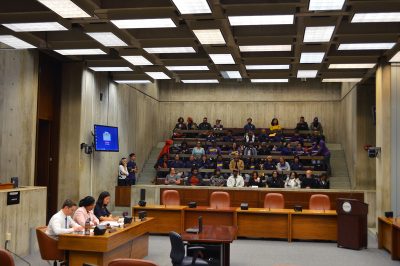
City leaders reviewed the findings of a July study Thursday that there is a high interest level citywide for a municipal ID, known as the Boston OneCard, by residents.
The proposal is sponsored by Boston City Councilor At-Large Michelle Wu and could potentially aid those who currently face difficulty obtaining a government-issued form of identification, according to the report.
District 1 City Councilor Lydia Edwards told The Daily Free Press that the municipal ID card would help several minority groups move in and out of municipal establishments, such as libraries and hospitals.
“It touches several populations — homeless folks, low-income individuals — who otherwise don’t get driver’s licenses and also immigrants of all status to assure that they have an opportunity to be seen, recognized and to, I think for many of them, to be counted fully at the municipal level,” Edwards said.
Having municipal ID cards is of interest to many minority groups, including immigrants and Spanish speakers, the study states. However, some people in the study expressed concern about the card becoming an “immigrant card.”
Edwards said the municipal ID would be available to residents who already have other forms of identification and would not be used as a vetting tool against immigrants within the city.
“I think that the goal is to write it in a way that we’re not asking people for their immigration status, so it’s not like we’d be able to give that information to Immigration, for example,” Edwards said. “I can get a municipal ID, even though I also have a driver’s license, so it’s not like you’re going to vet me and find out all of these different things about me.”
Erin O’Brien, a University of Massachusetts Boston associate professor of political science, said implementing a municipal ID system could be a “real policy test” for city councilors based on how Boston is a majority-minority city.
“There is a strong undocumented population, but there’s also racial resentment and anti-immigrant fervor that Boston is not immune to,” O’Brien said. “I think a vocal minority might have some problem with it. It really depends a lot on how the city councilors roll it out, how they define it.”
O’Brien said she thinks the city councilors are “smart enough” to implement the municipal ID in a successful way.
“It needs to be done right in terms of framing and in terms of understanding what it does and doesn’t entitle residents who cannot get IDs otherwise,” she said.
The feasibility study states that approximately 56 percent of adults in Boston would be likely to use the OneCard, totalling between 257,300 and 346,972 adults. The OneCard could also potentially bundle a traditional ID card with a library card and a CharlieCard, the study states.
Manisha Shrestha, 29, of Brighton, said she does not understand how the Massachusetts Bay Transportation Authority CharlieCard and municipal card relate but thinks the OneCard is a good idea, especially for immigrants.
“If, for some reason, they’re not able to get that ID, whether that be state or federal, it allows people to have some sort of identification, especially because there are so many immigrants that have been here for years,” Shrestha said.
Chris Walters, 44, of Back Bay, said he is worried that a municipal ID might bring unnecessary attention to immigrants.
“It could be like a red flag to people, when they flash the card, that they’re not from here and they’re different and might be a cue that would make people treat them differently,” Walters said.
Pallavi Razdan, 30, of Brighton, said that as an immigrant, she thinks her life would be made easier with a municipal ID card, even though she currently has a student ID.
“It’s difficult to buy liquor, it’s difficult to buy a lot of things that you require an ID for,” Razdan said. “If you’re traveling and you need to show an ID, I need to show my passport every time, so I think that it’s a good idea.”
Joel Lau and Natalie Patrick contributed to the reporting of this article.























































































































Km • Dec 4, 2018 at 2:40 pm
Good to know Boston wants to be a sanctuary city. What about the residents who pay for these services? Do you even care what they think?.